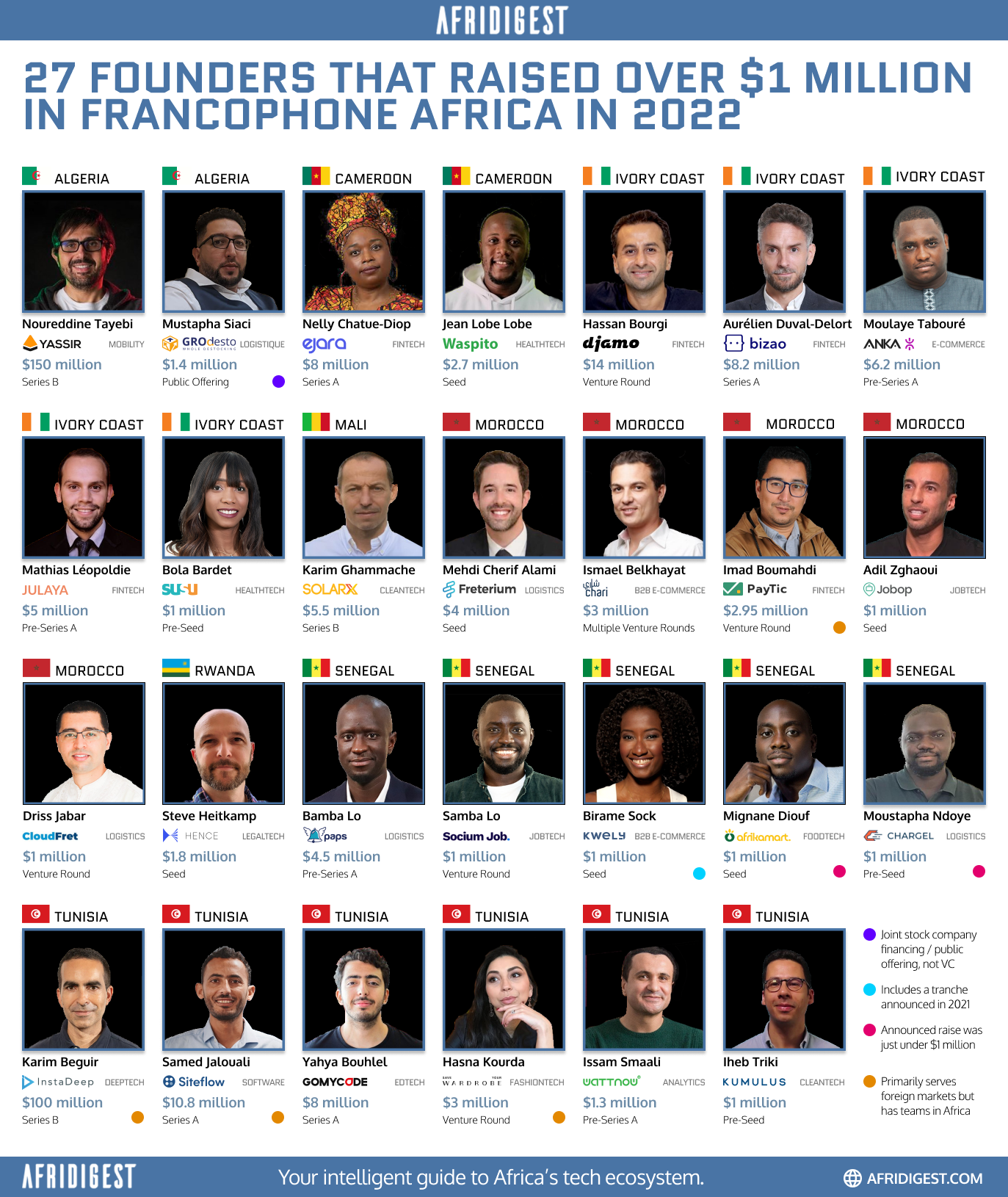While conventional startup & VC wisdom across Africa and elsewhere is to chase huge markets above all else, the reality is that focusing on dominating ‘niche’ markets is a savvy way to avoid competition and achieve efficient growth, not just cash-burning momentum.
As it turns out, depending on the specific business, there’s a great deal of logic in looking beyond the continent’s largest markets like Nigeria which are chock-full of competition.
And while ‘niche’ doesn’t just refer to geography, Francophone Africa in particular presents a number of interesting untapped & often overlooked opportunities.
For example, according to Partech’s 2022 Africa Tech Venture Capital report, while startups in the continent’s four main hubs (Nigeria, Egypt, Kenya, and South Africa) cumulatively attracted nearly half of the $4.9 billion in equity that was raised across the ecosystem last year, startups in Francophone Africa accounted for just 11%.
So, if you’re a tech entrepreneur on the continent that doesn’t focus on the four NEKS countries, it can be difficult to attract funding for even the most promising companies.
That said, here are 27 founders Afridigest identified that raised $1 million or more in 2022 for companies born in, focused on, or heavily supported by teams in Francophone Africa:

We asked a few of these founders to share some thoughts on the challenges of building companies in Francophone Africa and here’s what they had to say:
“For both my seed and Series A rounds, I generally had to start my pitches with a map of Africa as most investors were not familiar with this part of the continent and the opportunities herein! It’s obviously more challenging building here as we lack the ecosystem support that has been built in other countries. So, at times, I feel not only like I’m reinventing the wheel, but also very lonely — especially as a female founder.
You have to educate basically everyone: your team on how to deliver a product that meets international standards, customers on how to use your app, regulators that try to fit you in a regulatory framework that doesn’t yet exist, partners that don’t understand your business (and thus are skeptical of you by default), and more.
The bright spot, though, is pioneering something exceptional on the ground. Whether Ejara is successful or not, I’m convinced our story will be part of the rise of investment & the tech ecosystem in this geography. My team and I are proud of that.”
— Nelly Chatue-Diop, Co-Founder & CEO, Ejara
“As entrepreneurs in Francophone Africa, we are native in French and not always very comfortable in English. Sadly, the main VCs, those with the most ‘dry powder’ who are willing to accept decent valuations, tend to only speak English. Therefore, we have to explain our business to them in a language foreign to us, competing with English-speaking entrepreneurs who will have de-facto better communication skills in their main language. It’s a real disadvantage for francophone African entrepreneurs when it comes to fundraising.”
— Ismael Belkhayat, Co-Founder & CEO, Chari
“Having raised funding for my previous startups in the US, I can safely say that the experience of starting a company and raising funds is quite different in Francophone Africa. The type of funding available and type of investors present are often motivated by a very different set of criteria such as impact and contributions to economic growth in the region. While it makes it more complex, it definitely reflects greater care in investing.”
— Birame Sock, Founder & CEO, Kwely
“When it comes to Francophone Africa, fundraising is one of the main challenges for tech entrepreneurs. Historically, not many funds have displayed a serious interest in the region at early stage, and explaining the market opportunity to international investors can be a challenge. Markets are quite different compared to Nigeria, South Africa, Egypt, and Kenya, and individual markets are much smaller. That said, there are many similarities across markets in the region and international expansion is much faster & more straightforward across Francophone Africa.”
— Mathias Léopoldie, Co-Founder & CEO, Julaya
“What are some of the challenges, fundraising or otherwise, of being a founder in Francophone Africa? I want to talk about the opportunities, my mind doesn’t process challenges — I think only opportunities.
These include a highly integrated market: single currency, same language, lots of cultural traits shared. Same ports for domestic and hinterland countries, making it easier to scale our businesses. A huge diaspora with global experience willing to contribute when it comes to creating value for the country. More and more investors who appreciate the potential to find great opportunities at reasonable prices. And very pragmatic founders.”
–Bamba Lô, Co-Founder & CEO, Paps
Finally, press play below and listen to Moulaye Tabouré, Co-Founder & CEO of Anka, close out this discussion about challenges & opportunities in Francophone Africa in his own voice:
Ultimately, it’s better to become a big fish in a blue ocean than a small fish in a red one, and Francophone Africa today, while perhaps offering smaller TAMs, presents several legitimate blue ocean opportunities.
As Peter Thiel wrote memorably in the critically acclaimed book Zero to One, “All failed companies are the same: they failed to escape competition.”

Share: